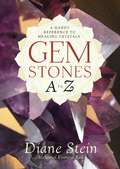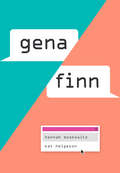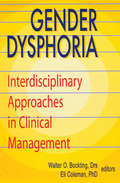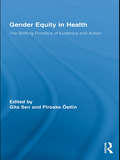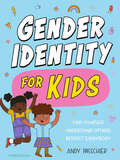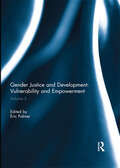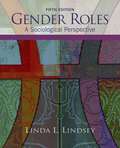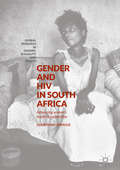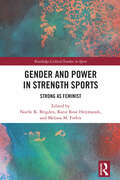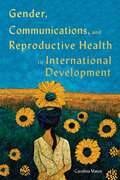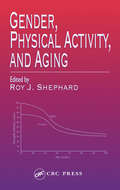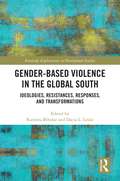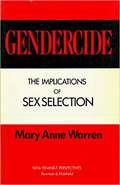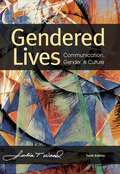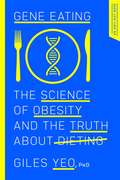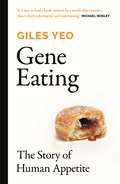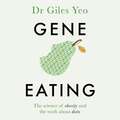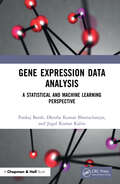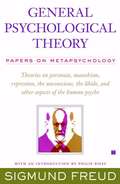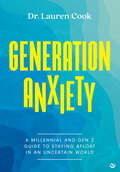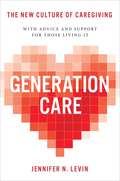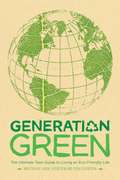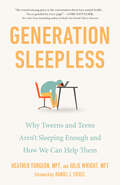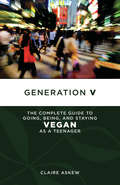- Table View
- List View
Gemstones A to Z: A Handy Reference to Healing Crystals
by Diane SteinLegendary healer Diane Stein shares her extensive knowledge of gemstones in this concise agate-to-zircon reference. Each listing includes the stone's common name, its corresponding color and chakra, and a concise resume of its healing properties. Stein suggests ways to use stones to support physical and psychic well-being, by simply carrying one in a hand or pocket, wearing it as jewelry, or engaging in more advanced practices like the "laying on of stones." She also presents a glossary of terms designed for beginning students of metaphysical healing practices, and teaches how to clear, dedicate, and maintain crystals to maximize their beneficial effects. A quick reference to 550 gemstones and crystals (including many that are new to the marketplace), and their special healing properties and most helpful applications. Includes diagrams of the Kundalini (physical) and Hara Line (emotional) chakra healing systems for simplified cross-referencing with the stones. Diane Stein's books have sold more than half a million copies and are available in six languages.
Gena/Finn
by Hannah Moskowitz Kat HelgesonGena and Finn would have never met but for their mutual love for the popular show Up Below. Regardless of their differences—Gena is a recent high school graduate whose social life largely takes place online, while Finn is in her early twenties, job hunting and contemplating marriage with her longtime boyfriend—the two girls realize that the bond between them transcends fanfiction. When disaster strikes and Gena's world turns upside down, only Finn can save her, and that, too, comes with a price. Told through emails, text messages, journal entries, and blog posts, Gena/Finn is a story of friendship and love in the digital age.
Gender Dysphoria: Interdisciplinary Approaches in Clinical Management
by Edmond J Coleman Walter O BocktingAn exploration of the diverse presentations of gender dysphoria and how it affects an individual's physical, psychological, social, and sexual adjustment, Gender Dysphoria provides comprehensive and applicable treatment approaches available for a wide spectrum of presentations of this disorder. The need for evaluating and treating gender dysphoria in the context of the gender dysphoric client's overall mental and physical health is stressed. International experts in the clinical management of gender dysphoria contribute valuable information on contemporary approaches in assessment, psychological and medical treatment, and adjustment of individuals with gender identity disorders. In Gender Dysphoria, clinicians will find important information on hormone therapy options and their physical results and side effects, and the effectiveness of sex reassignment surgery in improving a gender dysphoric client's adjustment. This comprehensive book covers a wealth of topics essential for clinicians who treat gender dysphoria, including:terminology and classification of gender identity disordersa validation of the “Cross-Gender Questionnaire,” a newly developed clinical assessment toolreported regrets of post-surgical transsexualsthe affective component of gender dysphoria in young boysa model for identifying and treating gender identity disorder in femalesa thorough description of a comprehensive treatment approach for a wide spectrum of presentations of gender dysphoria Filled with useful information on the clinical management of gender identity disorders, Gender Dysphoria meets the practical needs of clinical sexologists, psychotherapists, counselors, social workers, physicians, sex researchers, social scientists, and specialists who evaluate and treat gender dysphoria.
Gender Equity in Health: The Shifting Frontiers of Evidence and Action (Routledge Studies in Health and Social Welfare)
by Gita Sen Piroska ÖstlinThis volume brings together experts from a variety of disciplines, such as medicine, biology, sociology, epidemiology, anthropology, economics and political science, who focus on three areas: health disparities and inequity due to gender, the specific problems women face in meeting the highest attainable standards of health, and the policies and actions that can address them. Highlighting the importance of intersecting social hierarchies (e.g. gender, class and ethnicity) for understanding health inequities and their implications for health policy, contributors detail and recommend policy approaches and agendas that incorporate, but go beyond commonly acknowledged issues relating to women’s health and gender equity in health.
Gender Identity for Kids: Find Yourself, Understand Others and Respect Everybody
by Andy PasschierA fun, approachable and easy-to-use guide to gender identity for 7+ readers with colourful illustrations throughout. What is gender and what does it mean to you? What are ways people express their gender? What if you don't feel like the gender everyone says you are? This book is a simple approach to the subject communicated through an accessible and fun format, pitched perfectly for the age group.At a time when trans rights are being discussed all over the globe, a book speaking directly to kids in accessible and accepting language is desperately needed. Trans non-binary illustrator Andy Passchier breaks down modern-day conversations about gender identity into easily understandable sections, providing essential support to young people and the grown-ups in their lives.
Gender Justice and Development: Volume II
by Eric PalmerVulnerability and empowerment are central concepts of contemporary development theory and ethics. Vulnerability associated with human interdependence is a wellspring of values in care ethics, while vulnerability arising from social problems demands remedy, of which empowerment is frequently the just form. Development planners and aid providers focus upon improving the wellbeing of the most vulnerable – especially women – by empowering them economically, socially and politically.Both vulnerability and empowerment are considered in this volume. Drydyk argues that empowerment is necessarily relational, not simply a matter of expanding choices. Koggel reviews Drydyk’s discussion through the lens of feminist relational theory, considering how norms, structures and institutions shape, delimit, and promote empowerment. Presbey examines empowerment in East African women’s lives through the writings and biography of Wangari Maathai. Kosko considers indigenous self-governance and participation in shared governance. Khader reflects upon postcolonial feminist criticism of the concept of adaptive preference. Panitch discusses the economic vulnerability that surrounds the global market in surrogate birth. Pandey provides a review of third world eco-feminist activism and literature. Cudd envisions international humanitarian intervention to support female autonomy against oppressive state and social institutions. This book was originally published as a special issue of the Journal of Global Ethics.
Gender Roles: A Sociological Perspective
by John Mcmanama Linda L. LindseyFor mid-to-upper level courses in Gender Roles, Introduction to Women's Studies, and Sociology of Sex Roles. This text provides a balanced, non-polarized view of controversial issues that dispel gender myths and demonstrates how material can be meaningfully applied to a student's personal life. Focusing on the most recent research and theory--both in the U. S. and globally--Gender Roles provides an in-depth, survey and analysis of modern gender roles and issues from a sociological perspective while also integrating insights and research from other disciplines like biology, psychology, anthropology and history.
Gender and HIV in South Africa: Advancing Women's Health And Capabilities (Global Research In Gender, Sexuality And Health Ser.)
by Courtenay SpragueThis book addresses the ongoing problem of HIV in black South African women as a health inequity. Importantly, it argues that this urgent problem of justice is changeable. Sprague uses the capabilities approach to bring a theory of health justice, together with multiple sources of evidence, to investigate the complex problem of HIV and accompanying poor health outcomes in black South African women. Motivated by a concern for application of knowledge, this work discusses how to better conceptualise what health justice demands of state and society, and how to mobilise available evidence on health inequities in ways that compel greater state action to address problems of gender and health. HIV in women, and possible responses, are investigated on four distinct levels: conceptual, social structure, health systems, and law. The analysis demonstrates that this problem is indeed modifiable with long-term interventions and an enhanced state response targeted at multiple levels. This book will be of interest to academics and students in the social health sciences, gender and development studies, and global health, as well as HIV/health activists, government officials, policy makers, HIV clinicians and health providers interested in HIV.
Gender and Power in Strength Sports: Strong As Feminist (Routledge Critical Studies in Sport)
by Katie Rose Hejtmanek Noelle K. Brigden Melissa M. ForbisThis book explores strength sports as a site of political contestation and a platform for insurgent gender practices. It contributes to our understanding of key themes in the study of sport, such as feminism, power, the body and identity. Drawing together interdisciplinary work spanning political science, sociology, gender studies, and biological and cultural anthropology, the book argues that in the face of ongoing embodied precarity, strength sports have become a complex form of both resistance to, and reproduction of, patriarchy. This argument also challenges traditional understandings and definitions of “strength.” Covering recreational-level participation and elite athletics, across experiential/individual, local, national, transnational, and global scales, the book explores diverse topics such as the pregnant strength athlete, the status of trans women in strength sports, and the gendered dimensions of online fitness communities during the COVID-19 pandemic. In so doing, it traces power dynamics and the interplay among multiple oppressions. Showcasing important empirical and activist research, this book is fascinating reading for anybody with an interest in women’s sport, women’s studies, gender studies, the sociology of sport, strength and conditioning, feminist politics, or cultural studies.
Gender, Communications, and Reproductive Health in International Development (McGill-Queen's/Brian Mulroney Institute of Government Studies in Leadership, Public Policy, and Governance #15)
by Carolina MatosTo this day, women globally are subjected to forms of control over their bodies, and their ability to exercise their reproductive rights in particular is still constrained. Amid a rise of challenges to the advancement of women’s rights, including the recent overturning of Roe v. Wade in the United States, sexual and reproductive health rights are at the forefront of conversations about the advancement of gender equality. To determine how communications are used strategically to shape policy, Carolina Matos explores fifty-two feminist and health NGOs from across the world and how they are improving discourse on sexuality and reproductive health in the public sphere. She investigates how these organizations are making use of communications amid various contemporary challenges, including the proliferation of misinformation about women’s rights and health in the public sphere due to the actions of oppositional far-right nationalist groups. Through original in-depth interviews within the NGOs and empirical research of the institutions’ online presences, Matos unpacks the complexities of the relationship between women’s health, communications, and development, contributing to the fields of development, health communications, and gender studies, and advancing the debate on the role of feminist NGOs in advocating for women’s rights. With a postcolonial critique of the role of NGOs in development, Matos illuminates the strategic use of communications in the mediation and advocacy of gender equality and reproductive health.
Gender, Physical Activity, and Aging
by Roy J. ShephardWhy do women live longer than men? Does ownership of paired X chromosomes confer more prolonged survival on females, or is the gender difference in life-expectancy a cumulative consequence of differing life experiences for women and men? The areas of gender differences in aging, functional capacity, and the response to physical activity have often
Gender-Based Violence in the Global South: Ideologies, Resistances, Responses, and Transformations (Routledge Explorations in Development Studies)
by Dacia L. LeslieThis book amplifies the different voices and experiences of those facing gender-based violence (GBV) in the Global South. It explores the localised ways in which marginalised individuals design modes of coping with and address GBV, including cultural interpretations, and artistic and faith-based expressions.The book examines GBV triggers, prevalence, and societal impacts while referring to community, national, and regional mobilisation to deal with the phenomenon in its various manifestations, including physical, psychological, political, domestic, and public violence. It explores issues related to women’s negotiations with the patriarchal underpinnings of GBV; the role of the law and history in the perpetuation of GBV; the complementary role of culture and faith to legal protection against GBV, and access to justice for women and girls. In doing so, the book exposes understandings and expressions of GBV, as well as methodologies and indigenous initiatives to prevent it through local viable solutions. The book thus challenges the normalisation of GBV in the Global South.Providing concrete and culturally relevant suggestions for challenging ingrained models of gender understandings of violence in the Global South, this book will be of interest to academics in the fields of Development Studies, Gender Studies, Women’s Studies, Violence and Abuse Studies, Human Rights, Criminal Law, and Socio-Legal Studies.
Gendercide: The Implications Of Sex Selection (New Feminist Perspectives)
by Mary E. WarrenIn this thought-provoking feminist study of the moral issues raised by new and emerging technologies of sex selection, Mary Anne Warren shows that these technologies could substantially undermine and ultimately reverse the progress women have made in today's society.
Gendered Lives: Communication, Gender, and Culture (10th Edition)
by Julia T. WoodWritten by leading gender communication scholar Julia T. Wood, GENDERED LIVES, 10th Edition introduces you to theories, research, and pragmatic information, demonstrating the multiple and often interactive ways that our views of masculinity and femininity are shaped within contemporary culture. With the most up-to-date research, balanced perspectives of masculinity and femininity, a personal introduction to the field, and a conversational first-person writing style, this engaging text encourages you to think critically about gender and our society.
Gene Eating: The Science Of Obesity And The Truth About Dieting
by Giles Yeo PhDAn indispensable, groundbreaking look at the way our genetic makeup influences our relationship with food. In an age of misinformation and pseudo-science, the world is getting fatter and the diet makers are getting richer. So how do we break this cycle that’s literally killing us all? Drawing on the very latest science and his own genetic research at the University of Cambridge, Dr. Giles Yeo has written the seminal “anti-diet” diet book. Exploring the history of our food, debunking marketing nonsense, detoxifying diet advice, and confronting the advocates of clean eating, Giles translates his pioneering research into an engaging, must-read study of the human appetite. In a post-truth world, Gene Eating cuts straight to the data-driven facts. Only by understanding the physiology of our bodies, their hormonal functions, and their caloric needs can we overcome the mis- information of modern dieting trends, empower ourselves to make better decisions, and achieve healthy relationships with food, our bodies, and our weight. Inspiring and revelatory, filled with lively anecdotes and fascinating details, Gene Eating is an urgent and essential book that will change the way we eat.
Gene Eating: The Story of Human Appetite
by Dr Giles Yeo'It is rare to find a book, written by a world-class scientist, that is both informative and entertaining. Giles not only delves into the science of obesity but, with honesty and great precision, skewers many of the more foolish fad diets out there. ' DR MICHAEL MOSLEY, bestselling author of The 8-Week Blood Sugar Diet'A hard-to-fault book written in a way that entertains as well as it informs ... Yeo's study of human appetite is packed with insights and revelations, incorporating up-to-date scientific thinking ... It's an anti-diet diet book you can trust' DAILY EXPRESS 'I really enjoy working with Giles - he makes so much sense, and cuts through the confusion about diet and health with refreshing directness. His excellent book Gene Eating busts myths and homes in on what you really need need to know. It's been a genuine help to me and I'm sure it will be to everyone who reads it.' HUGH FEARNLEY-WHITTINGSTALL 'Dr Yeo is a leading scientist in the field of obesity and one of our best science communicators. Everyone worried about their weight ought to read this book to digest its message about the importance of genetics.' ROBERT PLOMIN, author of Blueprint: How DNA Makes Us Who We Are 'An excellent and engaging book, but also an important one. It is about time that a serious, respected academic provided a voice of reason' Anthony Warner aka THE ANGRY CHEF 'Gene Eating is just a fantastic book exactly as you'd expect - but more so. Mainly it's very funny, packed with science and trivia and genuinely helpful weightloss and nutrition info' DR CHRIS VAN TULLEKEN, the BBCWhy are we all getting fatter?Why are some people hungrier than others?And why don't diets work? In an age of misinformation and pseudo-science, the world is getting fatter and the diet makers are getting richer. So how do we break this cycle that's killing us all? Drawing on the very latest science and his own genetic research at Cambridge University, Dr Giles Yeo has written the seminal 'anti-diet' diet book. Exploring the history of our food, debunking marketing nonsense and toxic diet advice, and confronting the advocates of 'clean eating', Dr Giles translates his pioneering research into an engaging, must-read study of the human appetite. Inspiring and revelatory, Gene Eating is an urgent and essential book that will empower us all with the facts we need to establish healthy relationships with food - and change the way we eat
Gene Eating: The Story of Human Appetite
by Dr Giles YeoCambridge geneticist, Dr Giles Yeo, has dedicated over 20 years studying how genes influence our eating habits. Instead of looking at how we have become obese, GENE EATING tackles the question of WHY some people eat more than others. The UK has the biggest waistlines in Western Europe and an enormous problem of other diet-related illnesses. Our modern lifestyle coupled with the food environment, has made weight-loss the biggest public health quest of today; more of us than ever before are desperately bingeing on unreliable promises made online, on food labels or by the recent proliferation of food 'gurus' who are hungry for a slice of the multi-million pound diet industry.Written with his accessible, good-humoured style, GENE EATING unravels this hugely complex answer and argues that understanding our genes and the biology of our food intake is essential if we are to effectively tackle the obesity epidemic and improve our health. This pioneering book is a ray of light in our murky 'post-truth' climate- a celebration of evidence-based science that everyone can digest.Read by Dr Giles Yeo(p) Orion Publishing Group 2018
Gene Eating: The Story of Human Appetite
by Giles Yeo'It is rare to find a book, written by a world-class scientist, that is both informative and entertaining. Giles not only delves into the science of obesity but, with honesty and great precision, skewers many of the more foolish fad diets out there. ' DR MICHAEL MOSLEY, bestselling author of The 8-Week Blood Sugar Diet'A hard-to-fault book written in a way that entertains as well as it informs ... Yeo's study of human appetite is packed with insights and revelations, incorporating up-to-date scientific thinking ... It's an anti-diet diet book you can trust' DAILY EXPRESS 'I really enjoy working with Giles - he makes so much sense, and cuts through the confusion about diet and health with refreshing directness. His excellent book Gene Eating busts myths and homes in on what you really need need to know. It's been a genuine help to me and I'm sure it will be to everyone who reads it.' HUGH FEARNLEY-WHITTINGSTALL 'Dr Yeo is a leading scientist in the field of obesity and one of our best science communicators. Everyone worried about their weight ought to read this book to digest its message about the importance of genetics.' ROBERT PLOMIN, author of Blueprint: How DNA Makes Us Who We Are 'An excellent and engaging book, but also an important one. It is about time that a serious, respected academic provided a voice of reason' Anthony Warner aka THE ANGRY CHEF 'Gene Eating is just a fantastic book exactly as you'd expect - but more so. Mainly it's very funny, packed with science and trivia and genuinely helpful weightloss and nutrition info' DR CHRIS VAN TULLEKEN, the BBCWhy are we all getting fatter?Why are some people hungrier than others?And why don't diets work? In an age of misinformation and pseudo-science, the world is getting fatter and the diet makers are getting richer. So how do we break this cycle that's killing us all? Drawing on the very latest science and his own genetic research at Cambridge University, Dr Giles Yeo has written the seminal 'anti-diet' diet book. Exploring the history of our food, debunking marketing nonsense and toxic diet advice, and confronting the advocates of 'clean eating', Dr Giles translates his pioneering research into an engaging, must-read study of the human appetite. Inspiring and revelatory, Gene Eating is an urgent and essential book that will empower us all with the facts we need to establish healthy relationships with food - and change the way we eat
Gene Expression Data Analysis: A Statistical and Machine Learning Perspective
by Dhruba Kumar Bhattacharyya Jugal Kumar Kalita Pankaj BarahDevelopment of high-throughput technologies in molecular biology during the last two decades has contributed to the production of tremendous amounts of data. Microarray and RNA sequencing are two such widely used high-throughput technologies for simultaneously monitoring the expression patterns of thousands of genes. Data produced from such experiments are voluminous (both in dimensionality and numbers of instances) and evolving in nature. Analysis of huge amounts of data toward the identification of interesting patterns that are relevant for a given biological question requires high-performance computational infrastructure as well as efficient machine learning algorithms. Cross-communication of ideas between biologists and computer scientists remains a big challenge. Gene Expression Data Analysis: A Statistical and Machine Learning Perspective has been written with a multidisciplinary audience in mind. The book discusses gene expression data analysis from molecular biology, machine learning, and statistical perspectives. Readers will be able to acquire both theoretical and practical knowledge of methods for identifying novel patterns of high biological significance. To measure the effectiveness of such algorithms, we discuss statistical and biological performance metrics that can be used in real life or in a simulated environment. This book discusses a large number of benchmark algorithms, tools, systems, and repositories that are commonly used in analyzing gene expression data and validating results. This book will benefit students, researchers, and practitioners in biology, medicine, and computer science by enabling them to acquire in-depth knowledge in statistical and machine-learning-based methods for analyzing gene expression data. Key Features: An introduction to the Central Dogma of molecular biology and information flow in biological systems A systematic overview of the methods for generating gene expression data Background knowledge on statistical modeling and machine learning techniques Detailed methodology of analyzing gene expression data with an example case study Clustering methods for finding co-expression patterns from microarray, bulkRNA, and scRNA data A large number of practical tools, systems, and repositories that are useful for computational biologists to create, analyze, and validate biologically relevant gene expression patterns Suitable for multidisciplinary researchers and practitioners in computer science and biological sciences
General Psychological Theory: Papers on Metapsychology
by Sigmund FreudIn fifteen essays, Sigmund Freud explains his most controversial theories exposing the darkest corners of the human psyche. Best known for his research into the unconscious mind, Sigmund Freud challenged the mores of conventional American society during the early twentieth century. This collection presents many of Freud's revolutionary ideas, showing how his theories changed the way people think about their emotions and actions, opening a rich dialogue about the methods and science of the brain. In a series of essays written between 1911 and 1938, readers follow Freud through clear explanations of how neurology and psychology influence our actions and govern personality traits and emotions, including the libido, narcissism, mourning, repression, dreams, paranoia, and melancholy. This volume illustrates how Freud was not afraid to venture into unknown areas of the human mind and that he was superbly equipped to expose its secrets. Exploring the hypotheses of the most controversial psychologist of the twentieth century, in his own words, may help us understand our own behaviors.
Generation Anxiety: A Millennial and Gen Z Guide to Staying Afloat in an Uncertain World
by Lauren CookFrom licensed clinical psychologist and TikTok therapist Dr. Lauren Cook comes this practical, relatable guide for millennials and Gen Z-ers struggling with anxiety.Millennials and Gen Z-ers are considered two of the most anxious generations in history. With many intense generation-specific stressors facing them in recent years – from climate change to political polarization, systemic racism, gun violence, financial instability and so much more – it&’s easy to see why more and more people are being diagnosed with anxiety at alarming rates.Taking a feminist and intersectional lens, Dr. Lauren Cook shares her own struggles with anxiety and provides easy, actionable steps to ride the waves of anxiety rather than constantly swimming against them. Chapters show you how you can learn to embrace anxiety, find those who can help you, incorporate preventative self-care strategies and stay afloat when it feels like anxiety is overwhelming you. Exercises include doing inner child work, gratitude lists, mindfulness for body neutrality and much more.This relatable, honest and information-packed book incorporates thorough, evidence-backed psychological research and diverse client experiences to illustrate a broad range of presentations of anxiety and help readers gain insight into their own stressors and effectively work through anxiety.
Generation Care: The New Culture of Caregiving
by Jennifer N. LevinFrom a writer and founder of national online support group Caregiver Collective and a caregiver herself, Jennifer N. Levin offers a comprehensive look at our current culture of care, with an emphasis on Millennial caregivers—providing a roadmap to solutions and an immediate call for policy change. More than 10 million Millennials are caring for aging parents before they've been able to fully launch their own careers and consider starting their own families, and that's not including the incalculable numbers of people affected by long COVID. Yet no one is naming this problem, talking about how it feels, or offering resources to ease the pressure of Millennial caregiver burnout. Jennifer N. Levin was 32 when her father was diagnosed with a rare degenerative illness. As she struggled with few resources and little support, she created Caregiver Collective, a national online support group for Millennial caregivers. Now Levin brings the wisdom from her own experience and that of her support group to Generation Care, a comprehensive look at this generation's culture of care. Filled with the voices of caregivers, expert commentary and research, and a roadmap to the solutions that can begin helping people now as well as build the policies of the future, Generation Care addresses the financial costs, the ambiguous sense of loss for millennials grieving the lives they thought they'd have, the impact of COVID and Long Covid, and strategies for getting help on the individual level and in relation to policy. Caregiving is an increasingly urgent crisis, with more than 10 million millennials caring for their aging parents before they're prepared for it. Generation Care brings this crisis to the fore, illuminates the real stories and people who are most affected, underscores the need for shifts in policy and giving support where it is most needed, and sounds a clarion call for change.
Generation Green
by Linda Sivertsen Tosh SivertsenWe all know about the Earth's environmental crisis, but there is someone who can truly make a difference: you. If you text your friends or chat with them online, download music to your iPod, or toss bottles and papers into recycling bins, you're already more eco-savvy than you think. It's just as easy to do even more to help save the earth, and Generation Green shows you how. This book: Lays out the inside scoop on the biggest issues affecting our planet, such as global warming and overflowing landfills * Offers dozens of tips on how to shop, dress, eat, and travel the green way * Includes interviews with teens like you who are involved with fun, innovative green causes * Shows that being environmentally conscious can be a natural part of your life -- and your generation's contribution to turning things around. It doesn't matter if you can't vote or drive. Your efforts -- big or small -- will contribute to saving the planet. It's time for all of us to take action. It's time to go green!
Generation Sleepless: Why Tweens and Teens Aren't Sleeping Enough and How We Can Help Them
by Julie Wright Heather TurgeonAn intimate glimpse inside a silent epidemic that is harming teens and how parents can help them reclaim the restorative power of sleep.If you could protect your teen from unnecessary anxiety, depression, and chronic stress, and foster a greater sense of happiness and well-being in their life, wouldn&’t you? In Generation Sleepless, the authors of the classic guide to helping babies and young children develop healthy sleep habits The Happy Sleeper uncover one of the greatest threats to our teenagers&’ physical and mental health: sleep deprivation. Caught in a perfect storm of omnipresent screens, academic overload, night owl biology and early school start times, Generation Sleepless illustrates how our teens are operating in a constant state of sleep debt and "social jet lag" while struggling to meet the demands of adolescence. In this essential book, Heather Turgeon, MFT and Julie Wright, MFT draw on the latest scientific research to reveal that, at a critical phase of development, many teens need more sleep than their younger siblings, but they're getting drastically less. Generation Sleepless helps readers: • foster a teen's self-motivation for sleeping well • alter family practices around phones, social media, and screen time • draw on an understanding of teens' night owl tendencies to create smart sleep habits • lay out steps for sleep-friendly schools and promoting systemic changes that help teens get the rest they need This first-of-its-kind book is packed with clear and instantly usable advice for parents as well as an eye-opening call to action for teachers, principals, colleges, coaches, and policy makers.
Generation V: The Complete Guide to Going, Being, and Staying Vegan as a Teenager (Tofu Hound Press)
by Claire AskewCovering the ins and outs of becoming a vegan during the teen years, this reference shows young people how to make smart decisions about changing their diet and lifestyle while dealing with varying reactions from family, friends, and people at school. Curious teens will find answers for issues such as buying groceries with their families and sticking with the vegan mentality and diet, as well as important nutrition facts, delicious recipes, and inspirational stories. While some may find the switch to veganism daunting, this delightful handbook makes the transition simple, explaining ethical arguments and encouraging dedication and tolerance.
